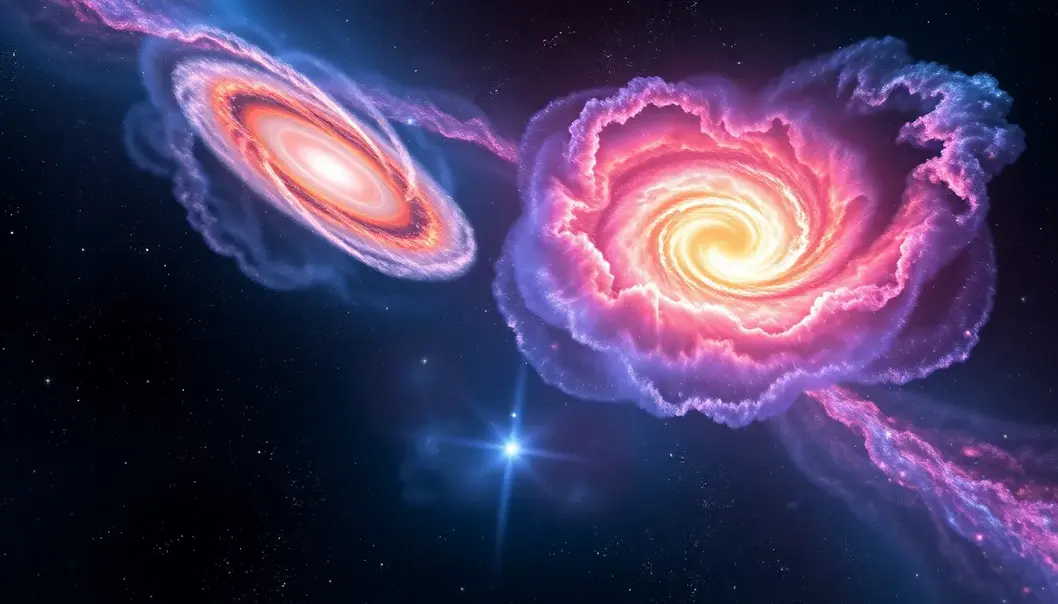Just like an unexpected game-winning shot or a breathtaking slam dunk, space exploration keeps pulling off incredible feats that captivate audiences worldwide. With audacious missions, surprising findings, and new horizons expanding our cosmic playbook, the universe continues to be an elite arena of discovery. Sports fans, known for their passion and enthusiasm, will find the recent breakthroughs in space sciences equally exciting. Imagine the thrill of discovering black holes colliding, or new planets waiting to be explored, much like untapped potential in a rookie player. Strap in as we venture into the celestial court where scientists make game-changing plays that redefine our understanding of the cosmos!
The Goal-Scoring Galaxies: Unveiling Cosmic Victories

In the vast cosmos, galaxies engage in events as enthralling as any dramatic sports match. Imagine entire galaxies colliding, merging, or forming, mirroring the strategic brilliance seen on a soccer field or basketball court. Cosmic collisions, much like a deftly maneuvered goal or a buzzer-beater shot, are testament to the unpredictable beauty and power of our universe.
With the advent of advanced technology, these awe-inspiring galactic interactions have become more observable than ever. Telescopes equipped with precision instruments allow astronomers to see galaxies behaving in ways that are both unpredictable and spectacular. Just as a soccer team executes a play with seamless precision, galaxies can also exhibit surprising harmony as they collide and merge. When two galaxies collide, tidal forces can lead to the birth of new stars, much like a team adapting in real-time to an unexpected opportunity.
One notable event, the collision between the Milky Way and the Andromeda Galaxy, is the cosmic equivalent of a legendary match-up. As billions of stars will eventually intermingle, this impending clash is a test of cosmic resilience and harmony, displaying a blend of violence and beauty comparable to the most intense sporting rivalries.
Such cosmic phenomena become accessible through powerful observatories, dedicated to pushing the boundaries of our understanding. Radio telescopes, for example, are paramount in studying these high-energy processes. They capture the prolonged dance of galaxies billions of light-years away. The data collected is akin to a coach’s playbook, detailing where, when, and how galaxies interact over cosmic times.
Just as sports enthusiasts revel in the splendor of a perfect play or solo genius on the field, the study of galaxies offers a window into the artistry and forces of nature on a grand scale. For those captivated by the drama of sports, the universe holds a treasure trove of cosmic victories and grand spectacles, revealing that, on the greatest stage of all, the game never ends.
Solar Systems: The Rookies Drafted from the Cosmic League

In the enigmatic realm of space exploration, the discovery of new solar systems is akin to scouting raw, untapped talent from distant lands to join an elite sports team. These celestial rookies, teeming with potential, offer thrilling possibilities of harboring life, expanding our cosmic roster with worlds that wait to be explored. Recent advancements in astronomy have unveiled a multitude of exoplanets, each unique in its composition and potential for hosting life. The search for these ‘rookie’ systems involves an array of sophisticated techniques and technologies designed to identify their signatures amidst the vast cosmic background.
The journey begins with meticulous observation, using an ensemble of space telescopes strategically positioned to gaze into the unknown. These mechanical scouts meticulously scan the heavens for subtle indicators of new worlds, primarily through methods such as the transit method, where a planet’s passage in front of its star causes observable dimming. Another key approach leverages the wobble method, detecting gravitational tugs planets exert on their stars, causing shifts in sunlight due to the Doppler effect.
But discovering these rookies is just the start. Each potential solar system could host planets within the so-called habitable zone—regions around a star where conditions might be just right for life. This possibility invigorates the scientific community, akin to discovering an athlete with unrefined yet undeniable skill and potential. The implications of finding these habitable cauldrons extend beyond imagination, as they challenge and redefine our understanding of life’s diversity and adaptability.
The excitement surrounding new solar systems is reminiscent of a draft day, with astronomers and researchers, much like sports scouts, evaluating their potential contributions to our understanding of the universe. In recent years, selection has grown beyond nearby stars to include distant systems, once thought unreachable. Advances in artificial intelligence and machine learning have further refined our ability to analyze data collected from various cosmic scouting efforts, enhancing our capacity to spot exoplanets that may have been overlooked by human eyes alone.
Importantly, these discoveries also raise significant philosophical and ethical considerations. As we draft these celestial novices into our league of solar systems, we must maintain awareness of the broader implications, including the stewardship and preservation of our own planet—a task akin to nurturing the homegrown talent that forms the heart of any successful team. The pursuit of these new worlds, no matter how promising, reminds us of the unique conditions that make Earth special and reinforces the importance of sustainable exploration practices.
While we push the boundaries of our reach into the cosmos, treasuring these rookie discoveries propels us forward, keenly aware of the cosmic backdrop from where our own journey began. The excitement of discovering new solar systems, peppered with the potential for revolutionary breakthroughs, mirrors the thrill of drafting a promising talent onto a team—full of potential, challenges, and the promise of something invaluable, yet beyond our immediate grasp.
Final words
As sports fans revel in the thrill of unexpected plays and game-changing moments, so too can they find excitement in the recent cosmic discoveries that stretch our understanding of the universe. These celestial events and findings ignite our imagination, much like a sporting event leaves us on the edge of our seats. The universe proves to be an endless field of play, challenging and inspiring us with its mysteries. Relish these moments of discovery as they are just as invigorating as your favorite game’s legendary plays.
Explore the endless cosmic playground and continue learning about these thrilling discoveries. Visit SpaceX to engage more with space exploration.
Learn more: https://www.spacex.com
About us
SpaceX offers cutting-edge space exploration services, bringing humanity closer to the cosmos. Dive into the world of rockets, space missions, and futuristic transport solutions as we strive to make life multiplanetary.



